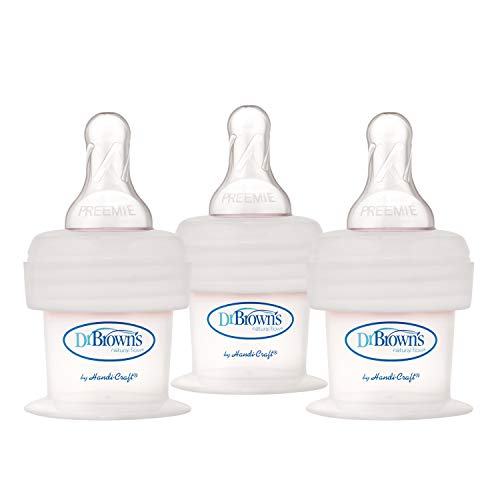When it comes to feeding your little one, there are few things more important than finding the right bottle. This is especially true if your baby was born premature, as preemies often have specific feeding needs that require extra attention and care. In this blog post, we’ll explore what preemie bottles are, why they’re important, and what to look for when choosing the best one for your baby.
What’s a Preemie Bottle?
Preemie bottles are designed specifically for premature babies who may have difficulty with feeding due to a variety of factors. These bottles are typically smaller than standard bottles, with a lower volume capacity, and are designed to help preemies feed more comfortably and easily. They also feature a slower flow rate than standard bottles, which is essential for babies who may not yet have developed the strength and coordination required for faster feeding.
Why are Preemie Bottles Important?
often face unique challenges when it comes to feeding. These challenges can include difficulty coordinating sucking, swallowing, and breathing, as well as a weak or underdeveloped sucking reflex. Preemie bottles are designed to address these challenges by providing a feeding solution that is tailored to the specific needs of premature babies. By using a preemie bottle, you can help your little one feed more comfortably and successfully, which can be crucial for their overall health and well-being.
What to Look for in a Preemie Bottle
When it comes to choosing a preemie bottle for your baby, there are a few key factors to consider. These include:
- Size and Shape: Preemie bottles should be smaller than standard bottles, with a capacity of around 2-4 ounces. They should also have a shape that is easy for your baby to hold and grip, with a soft, flexible nipple that mimics the feel of breastfeeding.
- Flow Rate: The flow rate of the bottle should be slow and gentle, allowing your baby to feed at a pace that is comfortable for them. This can help prevent choking and ensure that your baby is able to get the nutrients they need without becoming overwhelmed.
- Ease of Use and Cleaning: Preemie bottles should be easy to use and clean, with minimal parts that can be quickly and easily assembled and disassembled. Look for bottles that are dishwasher safe or can be sterilized easily.
- Material: Preemie bottles can be made from a variety of materials, including glass, plastic, and silicone. Choose a material that is safe, durable, and easy to clean.
- Brand Reputation: Look for brands that are well-established and have a reputation for producing high-quality, reliable preemie bottles. Read reviews and ask for recommendations from other parents or your pediatrician.

Do Preemies Need Special Bottles?
Yes, preemies often require special bottles that are designed to meet their unique feeding needs, such as smaller size, slower flow rate, and softer, more flexible nipples. These bottles can help preemies feed more comfortably and successfully, providing the nutrients they need to grow and develop.
Which Feeding Bottle Is Best for Premature Baby?
The best feeding bottle for a premature baby is one that is specifically designed for their unique needs. Look for bottles that are smaller in size, have a slower flow rate, and feature a soft, flexible nipple that mimics the feel of breastfeeding. It’s also important to choose a bottle that is easy to use and clean, and made from safe, durable materials. Some popular brands of preemie bottles include Dr. Brown’s Preemie Bottle, Medela SpecialNeeds Feeder, and Tommee Tippee Closer to Nature Preemie Bottle. However, it’s always best to consult with your pediatrician to determine the best feeding bottle for your baby’s specific needs.
What Bottles Do They Use in NICU?
The bottles used in the NICU (Neonatal Intensive Care Unit) can vary depending on the hospital and the specific needs of each premature baby. However, many NICUs use specialized feeding systems such as the Medela SpecialNeeds Feeder, which is designed for preemies who have difficulty with breastfeeding or bottle-feeding. Other popular options include Dr. Brown’s Preemie Bottle and the Enfamil Slow-Flow Soft Nipple, which are designed to simulate the flow and feel of breastfeeding while also reducing the risk of choking or gagging. In some cases, hospitals may also use feeding tubes or other specialized feeding devices to provide nutrition to premature babies who are not yet able to feed orally.
Conclusion
Feeding a premature baby can be a challenging experience, but with the right preemie bottle, you can help your little one thrive. By choosing a bottle that is tailored to your baby’s specific needs, you can ensure that they are able to feed comfortably and successfully, getting the nutrients they need to grow and develop. With a little bit of research and careful consideration, you can find the perfect preemie bottle for your baby, helping them on their journey to a happy, healthy childhood.



